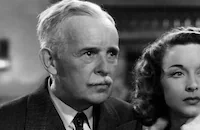The National Barn Dance
Brief Synopsis
Cast & Crew
Hugh Bennett
Jean Heather
Charles Quigley
Robert Benchley
Mabel Paige
Charles Dingle
Film Details
Technical Specs

Synopsis
Chicagoan Johnny Burke desperately wants to work at the Mitcham Advertising Agency but has only been able to loiter in the waiting room. In order to see Mitcham, Johnny poses as a barber and cuts Mitcham's hair in his office. Mitcham takes to Johnny's idea of using a hillbilly group from Midvale for a radio campaign for Garvey Soups, but then angrily throws Johnny out when he miscuts his hair. Johnny's bighearted Irish landlady loans him five dollars to go to Midvale, even though he owes her rent, and he arrives while the locals are being entertained at a barn dance. Johnny meets local beauty Betty and dances with her, and afterward, she introduces him to the performers: her sister Lulu Belle, a singer, and Lulu Belle's husband Scotty; Joe Kelly, Pat Buttram; The Dinning Sisters; and musicians known as the Hoosier Hot Shots. The country folk welcome Johnny into their homes, and after attending church the next day, Johnny, who is posing as general manager of Mitcham's agency, signs them to a contract, and they eagerly look forward to earning enough money to help pay for the church. Johnny takes them all to Chicago, where his landlady puts them up, but when he barges into Mitcham's office, he is told that the hillbillies would not project the right kind of image for the soup company. Mitcham throws Johnny out of his office again, but having overheard that Mitcham is having the Garveys over for dinner and is in need of servants, Johnny concocts another scheme. Johnny and his Midvale friends pose as Mitcham's new servants, and during the homestyle dinner cooked by Lulu Belle, they perform their music in the kitchen. Mitcham is appalled, but Mrs. Garvey, who grew up on a farm, is delighted by the food and the music and insists that Mitcham hire them. All goes well during the recording session until Pat, whom Mrs. Garvey has insisted be the spokesperson because of his peculiar voice, refuses to endorse the soup because he has never tasted it. He is immediately pulled off the air, and the group, now billed as the National Barn Dance, is fired. Johnny begs Mitcham for another chance, but Mitcham threatens to call the police on him. Just after Johnny leaves his office, Mitcham receives four large baskets of fan mail for the National Barn Dance, and sends his barber and manager to retrieve Johnny. Johnny and his country friends have already returned to Midvale and are in the middle of another barn dance when Mitcham and a radio crew from the WLS station in Chicago come in. After Mrs. Garvey gives Pat a taste of the soup, and he agrees that it tastes good, the country performers are re-hired and a radio broadcast is issued from the barn. Johnny reunites with Betty, with whom he has fallen in love, and Pat prepares to endorse Garvey's mushroom soup during the broadcast, until he discovers that he has never tasted their mushroom soup.

Director
Hugh Bennett
Cast
Jean Heather
Charles Quigley

Robert Benchley
Mabel Paige

Charles Dingle
Pat Buttram
Lulu Belle And Scotty
The Dinning Sisters
The Hoosier Hot Shots:
Paul Trietsch
Charles Ward
Ken Trietsch
Frank Kettering
[luther W. Ossenbrink]
Ronnie Rondell
Jack Mulhall
Stan Johnson

James Millican
Pat West

Fern Emmett

Ian Wolfe

Howard Hickman
Doodles Weaver
Mary Gordon
Arthur Q. Bryan
Billy Lechner
Patricia Farr
Charles Marsh
Oliver Prickett
Max Willenz
Albert Ruiz
Stephen Wayne
Constance Purdy
Phyllis Kennedy
Frank Faylen
Fred Sanborn
Syd Saylor
Wilbur Mack
Betty Farrington
Crew
John Connan
Jack Crosby
Everett Douglas
Hans Dreier
Jack Fascinato
Hal Fimberg
Arthur Franklin
Louis Ilda
Leonard Joy
Lester Lee
Lee Loeb
Walter Macewen
Jack Manus
Art Noel
Don Pelosi
Ferol Redd
Harry Revel
Jerry Seelen
Henry Sharp
Irvin Talbot
Walter Tyler
Ted Von Hemert
Paul Francis Webster
Wally Westmore
Philip Wisdom
Gracie Worth

Film Details
Technical Specs

Quotes
Trivia
Notes
Luther W. Ossenbrink's name is not listed in the onscreen credits, although his character name, "Arkie, the Arkansas Woodchopper," is listed. This film was inspired by the long-running National Barn Dance radio program, which originated on station WLS in Chicago, IL, then was broadcast nationally on the NBC radio network until 1946. The show was revived on the ABC radio network from 1948 to 1950. Lulu Belle and Scotty were the stars of this program.












